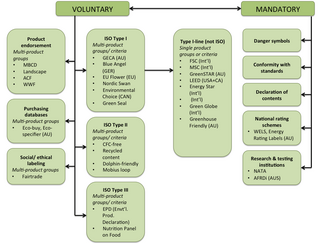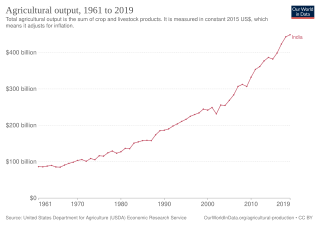
The economy of Bangladesh is a major developing market economy. As the second-largest economy in South Asia, Bangladesh's economy is the 33rd largest in the world in nominal terms, and 25th largest by purchasing power parity. Bangladesh is seen by various financial institutions as one of the Next Eleven. It has been transitioning from being a frontier market into an emerging market. Bangladesh is a member of the South Asian Free Trade Area and the World Trade Organization. In fiscal year 2021–2022, Bangladesh registered a GDP growth rate of 7.2% after the global pandemic. Bangladesh is one of the fastest growing economies in the world.

Organic certification is a certification process for producers of organic food and other organic agricultural products, in the European Union more commonly known as ecological or biological products. In general, any business directly involved in food production can be certified, including seed suppliers, farmers, food processors, retailers and restaurants. A lesser known counterpart is certification for organic textiles that includes certification of textile products made from organically grown fibres.

Halal is an Arabic word that translates to 'permissible' in English. In the Quran, the term halal is contrasted with the term haram. This binary opposition was elaborated into a more complex classification known as "the five decisions": mandatory, recommended, neutral, reprehensible and forbidden. Islamic jurists disagree on whether the term halal covers the first two or the first four of these categories. In recent times, Islamic movements seeking to mobilize the masses and authors writing for a popular audience have emphasized the simpler distinction of halal and haram.

Current good manufacturing practices (cGMP) are those conforming to the guidelines recommended by relevant agencies. Those agencies control the authorization and licensing of the manufacture and sale of food and beverages, cosmetics, pharmaceutical products, dietary supplements, and medical devices. These guidelines provide minimum requirements that a manufacturer must meet to assure that their products are consistently high in quality, from batch to batch, for their intended use. The rules that govern each industry may differ significantly; however, the main purpose of GMP is always to prevent harm from occurring to the end user. Additional tenets include ensuring the end product is free from contamination, that it is consistent in its manufacture, that its manufacture has been well documented, that personnel are well trained, and that the product has been checked for quality more than just at the end phase. GMP is typically ensured through the effective use of a quality management system (QMS).

The International Rice Research Institute (IRRI) is an international agricultural research and training organization with its headquarters in Los Baños, Laguna, in the Philippines, and offices in seventeen countries. IRRI is known for its work in developing rice varieties that contributed to the Green Revolution in the 1960s which preempted the famine in Asia.

The National Organic Program (NOP) is the federal regulatory framework in the United States of America governing organic food. It is also the name of the United States Department of Agriculture (USDA) Agricultural Marketing Service (AMS) program responsible for administering and enforcing the regulatory framework. The core mission of the NOP is to protect the integrity of the USDA organic seal. The seal is used for products adhering to USDA standards that contain at least 95% organic ingredients.

Ecolabels and Green Stickers are labeling systems for food and consumer products. The use of ecolabels is voluntary, whereas green stickers are mandated by law; for example, in North America major appliances and automobiles use Energy Star. They are a form of sustainability measurement directed at consumers, intended to make it easy to take environmental concerns into account when shopping. Some labels quantify pollution or energy consumption by way of index scores or units of measurement, while others assert compliance with a set of practices or minimum requirements for sustainability or reduction of harm to the environment. Many ecolabels are focused on minimising the negative ecological impacts of primary production or resource extraction in a given sector or commodity through a set of good practices that are captured in a sustainability standard. Through a verification process, usually referred to as "certification", a farm, forest, fishery, or mine can show that it complies with a standard and earn the right to sell its products as certified through the supply chain, often resulting in a consumer-facing ecolabel.

Bangladesh Bank is the central bank of Bangladesh and is a member of the Asian Clearing Union. It is fully owned by the Government of Bangladesh.
The Agricultural Marketing Service (AMS) is an agency of the United States Department of Agriculture; it maintains programs in five commodity areas: cotton and tobacco; dairy; fruit and vegetable; livestock and seed; and poultry. These programs provide testing, standardization, grading and market news services for those commodities, and oversee marketing agreements and orders, administer research and promotion programs, and purchase commodities for federal food programs. The AMS enforces certain federal laws such as the Perishable Agricultural Commodities Act and the Federal Seed Act. The AMS budget is $1.2 billion. It is headquartered in the Jamie L. Whitten Building in Washington, D.C.

The history of agriculture in India dates back to the Neolithic period. India ranks second worldwide in farm outputs. As per the Indian economic survey 2020 -21, agriculture employed more than 50% of the Indian workforce and contributed 20.2% to the country's GDP.

Agriculture is the largest employment sector in Bangladesh, making up 14.2 percent of Bangladesh's GDP in 2017 and employing about 42.7 percent of the workforce. The performance of this sector has an overwhelming impact on major macroeconomic objectives like employment generation, poverty alleviation, human resources development, food security, and other economic and social forces. A plurality of Bangladeshis earn their living from agriculture. Due to a number of factors, Bangladesh's labour-intensive agriculture has achieved steady increases in food grain production despite the often unfavorable weather conditions. These include better flood control and irrigation, a generally more efficient use of fertilisers, as well as the establishment of better distribution and rural credit networks.

Self Help Africa is an international charity that promotes and implements long-term rural development projects in Africa. Self Help Africa merged with Gorta in July 2014, and in 2021 merged with UK-based INGO, United Purpose. The organisation also owns a number of social enterprise subsidiaries - Cumo Microfinance, TruTrade and Partner Africa.
Sustainable coffee is a coffee that is grown and marketed for its sustainability. This includes coffee certified as organic, fair trade, and Rainforest Alliance. Coffee has a number of classifications used to determine the participation of growers in various combinations of social, environmental, and economic standards. Coffees fitting such categories and that are independently certified or verified by an accredited third party have been collectively termed "sustainable coffees". This term has entered the lexicon and this segment has quickly grown into a multibillion-dollar industry of its own with potentially significant implications for other commodities as demand and awareness expand.
Mutation breeding, sometimes referred to as "variation breeding", is the process of exposing seeds to chemicals, radiation, or enzymes in order to generate mutants with desirable traits to be bred with other cultivars. Plants created using mutagenesis are sometimes called mutagenic plants or mutagenic seeds.
Biotechnology and genetic engineering in Bangladesh is one of the thriving fields of science and technology in the country.

Gazipur City Corporation established in 2013, is one of the city corporations of Bangladesh. Gazipur City Corporation's total area is 329.23 square kilometers with approximately has the population of 2,674,697 people in the city corporation area. As of 2018, Gazipur City Corporation had 1.1 million voters.

Bangladesh–Canada relations are the foreign relations between Bangladesh and Canada established 1972. Canada is represented through its High Commission in Dhaka and Bangladesh is represented through its High Commission in Ottawa. They are members of the Commonwealth of Nations and the United Nations. Bangladesh currently receives ~$110 million from Canadian official development assistance per year as of January 2014. It is estimated that around 36,000 (2012) Bangladeshi people live in Canada, primarily in cities like Toronto, Vancouver, Montreal, Calgary, Edmonton, and Ottawa.

Bangladesh Standards and Testing Institution (BSTI) is an autonomous government body under the Ministry of Industries, established to control the standards of services, goods, weights and measures, and promote the adoption of the international system of units in Bangladesh. This institution is a Key Performance Indicator (KPI) of the Government of Bangladesh.
The Bangladesh Computer Council (BCC) is a statutory government organization operating under the Information and Communication Technology Division of the Ministry of Posts, Telecommunications, and Information Technology of the Government of Bangladesh (GoB). Its headquarters are situated in Agargaon, Dhaka, Bangladesh. It was initially known as the National Computer Committee (NCC) in 1983 and transformed into the Bangladesh Computer Council through Act No. 9 of the National Parliament in 1990.
Punjab Agri Export Corporation Limited (PAGREXCO) is a government enterprise established by the Government of Punjab in the year 1997 as the nodal agency for agricultural export from the state of Punjab, India. The company works for export of fresh and processed agricultural produce, infrastructural development and policy implementation in the state. It is a subsidiary of Punjab Agro Industries Corporation. The company has been awarded Sustainable Development Goals Action Award by the Punjab Planning Department for Sustainable Organic Production and Innovative Marketing System. It has also received Leadership award in Agriculture Marketing.













